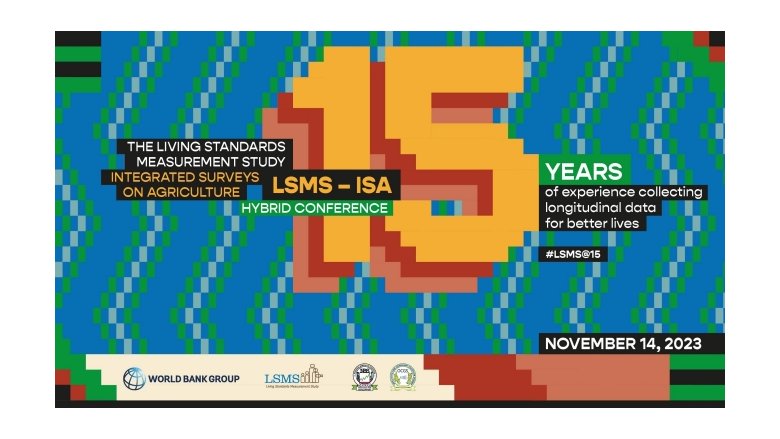Over the past 15 years, the World Bank’s premier longitudinal household survey project, the Living Standards Measurement Study – Integrated Surveys on Agriculture (LSMS-ISA), supported national statistical offices across Sub-Saharan Africa in conducting 30+ longitudinal household surveys and 160,000+ interviews.
The LSMS-ISA has pushed the frontier for innovations in survey data collection, and availability of longitudinal, multi-sectoral survey data – forever changing the landscape of development research to inform solutions to end poverty and food insecurity; strengthen resilience to shocks; promote gender equality; and improve smallholder agricultural productivity in the Region.
To commemorate its 15th anniversary, the LSMS-ISA team, the National Bureau of Statistics of Tanzania (NBS) and the Office of the Chief Government Statistician in Zanzibar (OCGS) have organized a hybrid conference on November 14, from 9:00 a.m. / GMT+3.
| 8:00- 9:00: Arrival and Registration | ||
| 9:00- 9:30: Opening Remarks | Dr. Mwigulu Nchemba, Minister of Finance, United Republic of Tanzania, Dr. Andrew Dabalen | United Republic of Tanzania, Chief Economist for the Sub-Saharan Africa, World Bank |
| 9:30- 10:30: Food Security, Structural Transformation, and Nutrition in Tanzania | Chair: Titus Mwisomba Discussant: Philip Wollburg | National Bureau of Statistics of Tanzania, World Bank |
| The Effects of Household Shocks on Children’s Nutrition Status. Evidence from Panel Survey in Tanzania. | Monica Sebastian Kauky | University of Dar es Salaam |
| Disaster Vulnerability and the Welfare of Smallholders Farmers in Tanzania | Gidion Njuga | Moshi Co-operative University |
| Livelihood Diversity Effects on Food Security of Rural Households in Tanzania | Rugazia Nyombi | Mwalimu Nyerere Memorial Academy |
| 11:00-12:00: Keynote Address | Prof. Douglas Gollin | Tufts University |
| 12:00-13:00: Food Security and Nutrition | Chair: Gbemisola Siwatu Discussant: Alemayehu Ambel | World Bank |
| Does Relative Deprivation Induce Migration? Evidence from Sub-Saharan Africa | Kashi Kafle | Texas A&M University |
| Targeting hunger or votes? The political economy of humanitarian transfers in Malawi | Jack Thunde | IDinsight |
| Child nutrition and farm input subsidies: The complementary role of early healthcare and nutrition programs in Malawi | Martin Limbikani Mwale | Stellenbosch University |
| 14:00-15:00: Gender and Agriculture | Chair: Amparo Palacios-Lopez Discussant: Sydney Gourlay | World Bank |
| Gendered Effects of Crop Diversification and Climate Shocks on Household Food Security Status in Nigeria | Mbanga Pagel Emmanuell Dorcas | University of Yaoundé |
| Internal Migration, Occupation Transmission, and Development: Evidence from Castes in Mali | Ismael, Yacoubou Djima | Paris School of Economics |
| Drought Shocks and Labor Allocation in Rural Africa: Evidence from Ethiopia | Arnold Musungu | University of Bonn |
| 15:00- 16:00: Climate Change and Resilience | Chair: Talip Kilic Discussant: Marco Tiberti | World Bank |
| Predicting Household Resilience using Machine Learning in Sub-Saharan Africa | Nouréini Souleymane Sayouti | CERDI |
| Monitoring Progress in Resilience Building in Africa within the Framework of the Malabo Declaration: Using Pseudo-Panel in the Case of Niger | Assad Bori | FAO |
| Dynamics of off farm self-employment in the West African Sahel | Sènakpon Fidèle A. Dedehouanou | Université d'Abomey Calavi |
| 16:30-17:30: Panel Discussion | Moderator: Dr. Talip Kilic Panelist: Dr. Albina Chuwa, Prof. Douglas Gollin Dr. Martin Chegere, Dr. Ruth Hill, Dr. Monica Kauky, | World Bank, Tufts University, National Bureau of Statistics of Tanzania, University of Dar es Salaam |
| 17:30-18:00: Closing Remarks | Dr. Gero Carletto | World Bank |
